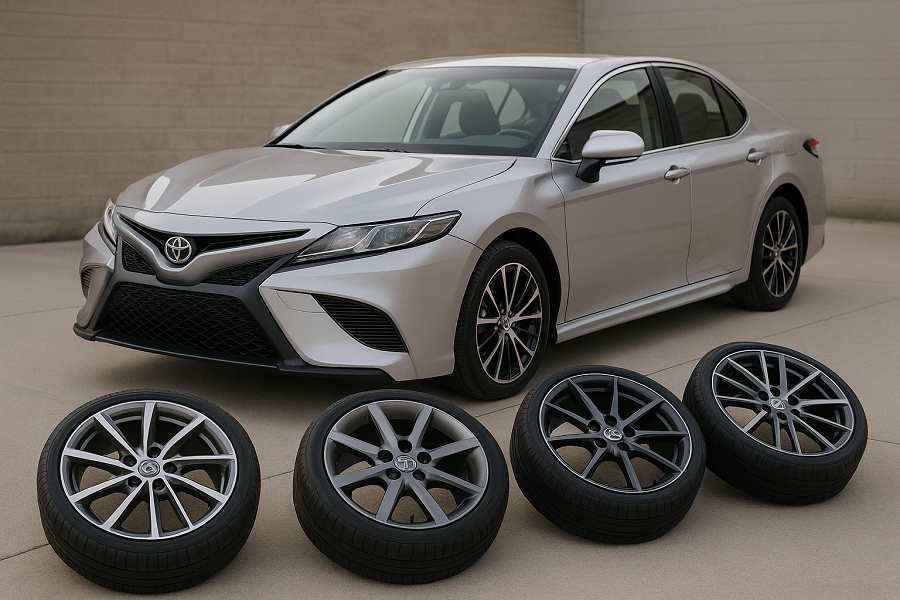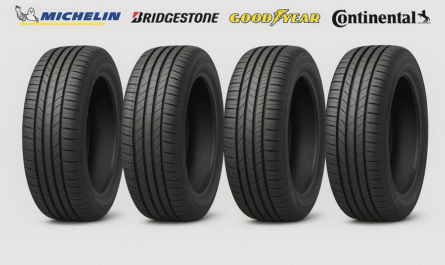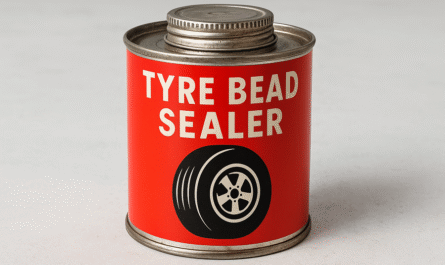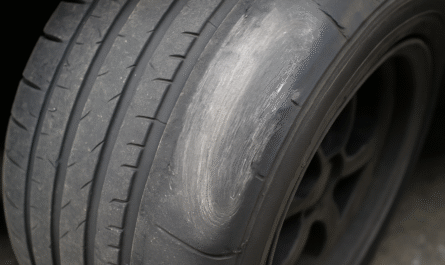Table of Contents
Table of Contents
Your Toyota Camry is more than just a car; it’s a statement. Whether you’re moving through the city or beating the highway, the suitable Rims for Toyota Camry can make your Camry stand out while boosting its performance and safety. Choosing the flawless rims isn’t just about looks; it’s about finding the right fit for your driving style, budget, and the vibe you want your car to give off.
In this manual, we’ll break down everything you need to know about Rims for Toyota Camry, from types and sizes to how they affect your car’s style and value. Whether you’re upgrading your Rims for toyota camry 2022, 2023, 2024, or 2025 Camry, we’ve got you covered with tips, tricks, and answers to your burning questions.
Why Rims Matter for Your Toyota Camry
Rims are like the shoes of your car; they can change its look and feel. The good set of Rims for Toyota Camry can enhance handling, fuel efficiency, and even how comfortable your ride is. But picking the wrong rims? That could mean poor performance, extra wear on your tires, or even damage to your car. For Camry owners, choosing the right rims is a great deal because this sedan is all about balancing style, reliability, and practicality.
Here’s why rims are so important:
- Style Boost: Rims can make your Camry look sporty, sleek, or luxurious, depending on your vibe.
- Performance Impact: The size, weight, and material of your rims affect how your car handles corners, accelerates, and brakes.
- Safety First: Properly fitted rims ensure your tires stay secure, reducing the risk of accidents.
- Resale Value: Unique, high-quality rims can increase your Camry’s appeal when it’s time to sell.
Ready to dive into the world of Toyota Camry wheel fitment? Let’s start with the different types of rims you can choose from.
Types of Rims for Toyota Camry: Pros and Cons
When shopping for Black rims for toyota camry, you’ll come across a few main types: steel, alloy, chrome, and custom. Each has its own strengths and weaknesses, so let’s break them down to help you decide.
Steel Rims
Steel rims are the most common type found on base-model Camrys, like the LE trim. They’re tough, affordable, and get the job done, but they’re not the flashiest option.
- Pros:
- Super durable—great for rough roads or harsh winters.
- Cheaper than other rim types, perfect for tight budgets.
- Easy to repair if they get bent or damaged.
- Cons:
- Heavy, which can reduce fuel efficiency and slow acceleration.
- Not very stylish—often covered with hubcaps for looks.
- Can rust if not properly maintained, especially in snowy climates.
Alloy Rims
Alloy rims are made from lightweight metals like aluminum, making them a popular choice for Camry owners who want a balance of style and performance. These are often standard on higher trims like the SE or XSE.
- Pros:
- Lighter than steel, improving handling and fuel economy.
- Sleek designs that enhance your Camry’s look.
- Better heat dissipation, which helps your brakes stay cool.
- Cons:
- More expensive than steel rims.
- Can crack or bend under heavy impact, like hitting a big pothole.
- Repairs can be costly compared to steel.
Chrome Rims
Chrome rims are all about making a bold statement. They’re shiny, eye-catching, and perfect for drivers who want their Camry to turn heads.
- Pros:
- Stunning, glossy finish that screams luxury.
- Resistant to rust, ideal for humid or coastal areas.
- Available in many designs for a custom look.
- Cons:
- Expensive—often one of the priciest options.
- Hard to clean; they show dirt and scratches easily.
- Heavier than alloy, which might affect performance slightly.
Custom Rims
Custom rims are designed for drivers who want something totally unique. These can be alloy or chrome but come in wild designs, colors, or even oversized options for a standout look.
- Pros:
- Endless customization options to match your personality.
- Can be tailored for specific performance needs, like racing or off-road.
- Makes your Camry one-of-a-kind.
- Cons:
- Very expensive, especially for high-end brands.
- May not always fit perfectly without spacers or adjustments.
- Could impact resale value if too flashy for most buyers.
| Rim Type | Best For | Price Range | Durability | Style Factor |
|---|---|---|---|---|
| Steel | Budget, durability | $50-$150 each | High | Low |
| Alloy | Performance, style | $100-$300 each | Medium | High |
| Chrome | Luxury, aesthetics | $200-$500 each | Medium | Very High |
| Custom | Unique look | $300-$1000+ each | Varies | Extreme |
Toyota Camry Rim Sizes: What Fits Your Model?
Choosing the right size Rims for Toyota Camry is essential for a safe and smooth ride. The Camry has been around for decades, and Rim sizes vary depending on the model year and trim. For 2023, 2024, and 2025 models (part of the VIII (XV70) Facelift generation), here’s what you require to know.
Common Rim Sizes for 2023-2025 Toyota Camry
The 2023-2025 Camry models typically come with these factory rim sizes, depending on the trim (LE, SE, XLE, XSE):
- 16-inch rims: Standard on LE models, often steel with hubcaps. Tire size: 205/65R16.
- 17-inch rims: Found on SE models, usually alloy. Tire size: 215/55R17.
- 18-inch rims: Common on XLE and some SE trims, alloy. Tire size: 235/45R18.
- 19-inch rims: Exclusive to XSE models, alloy with a sporty look. Tire size: 235/40R19.
Important Specs:
- Bolt Pattern: 5×114.3 mm (5×4.5 inches) for all modern Camrys.
- Center Bore: 60.1 mm.
- Offset: Typically 40-50 mm, depending on the rim size.
- Lug Nut Size: M12x1.5.
Can You Use Different Rim Sizes?
You can upgrade or downgrade rim sizes, but there are limits. For example, swapping 16-inch rims from an LE to 18 inch rims for toyota camry rims from an SE is possible, but you’ll need to match the tire size to keep the overall wheel diameter. This preserves your speedometer accuracy and controls issues with your car’s suspension or transmission.
- Smaller Rims (e.g., 16-inch): Better for comfort, fuel economy, and winter driving. Cheaper tires, too!
- Larger Rims (e.g., 19-inch): Improve handling and aesthetics but may reduce ride comfort and increase tire costs.
Will Older Camry Rims Fit Newer Models?
Rims from older Camry generations (like the 2007-2011 VI (XV40) or 2011-2017 VII (XV50)) may fit 2023-2025 models if they share the same 5×114.3 bolt pattern and 60.1 mm center bore. However, you must check the offset and confirm the rims clear the brakes. For example, 16-inch rims from a 2007 Camry (215/60R16) can work on a 2014 SE, but 18-inch rims from a 2010 TRD might require spacers to fit a 2021 Camry due to offset differences.

How to Choose the Right Rims for Your Camry
Picking the best rims for Toyota Camry 2023/2024/2025 depends on your budget, driving habits, climate, and how you want your car to look. Here’s how to make the right choice.
Budget
Rims can range from $50 to over $1,000 each, so set a budget before you shop.
- Under $200 per rim: Steel or basic alloy rims. Great for budget-conscious drivers or winter setups.
- $200-$500 per rim: High-quality alloy or chrome rims. Ideal for balancing style and performance.
- $500+ per rim: Custom or premium brands like Enkei or Ferrada. Perfect for show cars or enthusiasts.
Driving Habits
How you drive your Camry affects the rims you should choose.
- Daily Commuter: Stick with 16- or 17-inch alloy rims for comfort and fuel efficiency.
- Sporty Driver: Go for 18- or 19-inch alloy rims like the Enkei Raijin for better handling and a bold look.
- Highway Cruiser: Lightweight alloy rims (17-18 inches) improve fuel economy and reduce road noise.
Climate
Where you live plays a big role in rim choice.
- Snowy or Icy Areas: Steel rims are durable and affordable for winter tires. Avoid chrome, as it can corrode in salty conditions.
- Hot or Humid Climates: Alloy or chrome rims resist rust better than steel.
- Rough Roads: Stick with smaller rims (16-17 inches) to avoid damage from potholes.
Aesthetics
Want your Camry to look sleek, sporty, or luxurious? Rims are the key.
- Sleek and Modern: Try Ferrada FR4 rims with a deep concave design for a bold, aggressive stance.
- Classic and Timeless: Vors VR8 multi-spoke rims add sophistication without being too flashy.
- Luxury Vibes: Chrome or polished alloy rims, like the Asanti Black Label Monarch, scream high-end style.
Visual Impact and Customization: Make Your Camry Shine
Rims are one of the easiest ways to customize your Toyota Camry and make it your own. They can transform your car from “just another sedan” to a head-turner that reflects your personality.
How Rims Affect Your Camry’s Look
- Smaller Rims (16-17 inches): Practical and understated, great for a clean, no-fuss look.
- Larger Rims (18-19 inches): Sporty and aggressive, perfect for a modern, dynamic vibe.
- Custom Finishes: Matte black, bronze, or candy red rims (like the Asanti Monarch) add a unique flair.
- Low-Profile Tires: Pairing larger rims with low-profile tires (e.g., 235/40R19) gives a sleek, performance-driven look but may reduce ride comfort.
Customization Options
Want to go all out? Here are some ways to customize your Camry’s rims:
- Powder Coating: Change the color of your rims (e.g., gloss black or bronze) for $150-$600 for a set of four.
- Spacers: Use wheel spacers (3-5 mm) to adjust offset and give your Camry a wider, more aggressive stance.
- Unique Designs: Choose multi-spoke, deep-dish, or concave rims for a custom look that stands out.
Impact on Resale Value
Upgrading your rims can boost your Camry’s resale value, but it depends on the buyer.
- Pros:
- High-quality alloy or chrome rims can make your Camry more appealing.
- OEM rims (like those from Detroit Wheel and Tire) maintain factory aesthetics, which buyers love.
- Cons:
- Overly flashy custom rims might turn off buyers who prefer a stock look.
- Poorly fitted rims or cheap knockoffs can lower value due to potential damage.
Pro Tip: Keep your original rims if you plan to sell your Camry later. Buyers often prefer OEM setups, and you can sell aftermarket rims separately.
Aftermarket Rims vs. OEM Rims: What’s the Difference?
When shopping for Toyota Camry rims, you’ll need to decide between aftermarket rims and OEM rims. Here’s a quick comparison to help you choose.
OEM Rims (Original Equipment Manufacturer)
These are the rims that come straight from Toyota, designed specifically for your Camry.
- Pros:
- Perfect fit—no guesswork on bolt patterns or offsets.
- Maintains factory look and resale value.
- High quality, built to Toyota’s standards.
- Cons:
- Limited design options compared to aftermarket.
- Can be expensive, especially for higher trims like XSE ($150-$300 each).
Aftermarket Rims
These are made by third-party brands like Enkei, Ferrada, or Asanti, offering more style and customization.
- Pros:
- Tons of designs, sizes, and finishes to choose from.
- Often cheaper than OEM for similar quality ($100-$500 each).
- Can improve performance with lightweight options.
- Cons:
- Fitment isn’t guaranteed—check bolt pattern (5×114.3 mm), offset (40-50 mm), and center bore (60.1 mm).
- Quality varies; avoid cheap knockoffs that can crack or bend.
Recommendation: If you want a safe, no-hassle option, go with OEM rims from places like Hubcap Haven or Detroit Wheel and Tire. For a unique look, aftermarket rims from Fitment Industries or Ozzy Tyres offer great variety.
Toyota Camry Rim Replacement Guide
Need to replace a damaged rim or upgrade your Camry’s wheels? Follow these steps to make sure you get the right fit.
- Check Your Camry’s Specs:
- Confirm your model year (2023, 2024, or 2025) and trim (LE, SE, XLE, XSE).
- Verify the bolt pattern (5×114.3 mm), center bore (60.1 mm), and offset (40-50 mm).
- Choose Rim Size and Type:
- Stick with factory sizes (16-19 inches) for easy fitment.
- Decide between steel, alloy, chrome, or custom based on your needs.
- Match Tires:
- Use the correct tire size for your rim (e.g., 235/45R18 for 18-inch rims).
- Check load ratings and speed ratings to match your driving style.
- Buy from Reputable Sources:
- OEM Rims: Try Detroit Wheel and Tire or Hubcap Haven for factory originals.
- Aftermarket Rims: Shop at Fitment Industries, Ozzy Tyres, or Discounted Wheel Warehouse for variety and deals.
- Install Safely:
- Have a professional install your rims to ensure proper balancing and alignment.
- Check TPMS (Tire Pressure Monitoring System) compatibility, especially for 2023-2025 models.
- Maintain Your Rims:
- Clean regularly to prevent dirt buildup, especially on chrome rims.
- Inspect for cracks or bends after hitting potholes or curbs.
FAQs About Rims for Toyota Camry
Got questions about Toyota Camry wheel fitment or upgrades? Here are answers to common questions, written for high school readers.
Q: What’s the best rim size for a 2025 Toyota Camry?
A: It depends on your style! Toyota Camry Rims 16 Inch rims are great for comfort and fuel economy (LE trim). 18- or 19-inch rims (SE/XSE) look sporty but might make the ride bumpier.
Q: Can I put 19-inch rims on my Camry LE?
A: Yes, but you’ll need the right tire size (like 235/40R19) and offset (around 45-50 mm). Check with a pro to avoid rubbing or suspension issues.
Q: Are aftermarket rims better than OEM?
A: Aftermarket rims offer more style options and can be cheaper, but OEM rims are guaranteed to fit perfectly and maintain resale value.
Q: How much do new rims cost for a Camry?
A: Steel rims start at $50-$150 each, alloy rims are $100-$300, chrome rims are $200-$500, and custom rims can go over $1,000 each.
Q: Will bigger rims mess up my gas mileage?
A: Yes, larger rims (like 19-inch) with low-profile tires can slightly reduce fuel efficiency due to added weight and rolling resistance.
Q: Can I use rims from an older Camry on my 2024 model?
A: Maybe! If the bolt pattern (5×114.3 mm) and center bore (60.1 mm) match, they could work. Check the offset and brake clearance first.
Q: How do I know if a rim fits my Camry?
A: Look for a 5×114.3 mm bolt pattern, 60.1 mm center bore, and an offset between 40-50 mm. Use a site like wheel-size.com to double-check.
Conclusion: Find the Perfect Rims for Your Toyota Camry
Choosing the best car rims for Toyota Camry 2023/2024/2025 is all about balancing style, performance, and practicality. Whether you’re sticking with OEM rims for a factory-fresh look or going bold with aftermarket rims like the Ferrada FR4 or Enkei Raijin, make sure they match your Camry’s specs (5×114.3 mm bolt pattern, 60.1 mm center bore, 40-50 mm offset). Consider your budget, driving habits, and conditions to choose the right size (16-19 inches) and material (steel, alloy, chrome, or custom). With the right rims, your Camry can look fantastic, handle better, and even boost its resale value.



